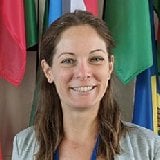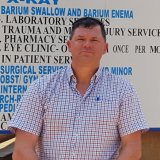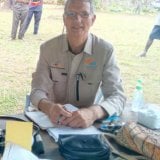| The course runs from 12 March to 23 July 2025 (Easter break 16 April 2025). |
Develop your career as part of the global nursing community!
Nursing in challenging environments requires knowledge of a broad range of health issues and practical tools to provide high-quality care to patients -wherever you are. This unique course prepares nurses and allied health professionals for work in low-resource settings and with vulnerable populations.
World-leading experts in their field teach through online sessions including interactive lectures, practical skills, and laboratory training. The vital insights they share open doors to careers around the world, as well as bringing fresh perspectives and understanding about the diversity and impact of nursing.
First established at LSHTM in 1996, it was the first programme of its kind that was designed with nurses in mind, acknowledging the vital role they play in health system strengthening and global nursing, while equipping them to work in a range of challenging circumstances with little or no infrastructural support. Our thousands of course graduates make significant contributions to global health. By taking this course you will also join this dedicated and supportive international network and become part of a lifelong alumni community.
What you will learn
Held up as the industry standard, the Professional Diploma in Tropical Nursing (PTDN) covers a huge breadth of topics including infectious disease, mental health, decolonisation, and women's and children’s health. We are constantly adapting our approach to incorporate new areas of practice or emerging health challenges.
The course features a highly popular virtual laboratory element which is new to many students. Guided by a range of interactive videos and lectures, you will have the chance to see down the microscope on your computer screen, and learn skills such as how to recognise malaria, TB, leishmaniasis, filariasis and other parasitic diseases. Blood grouping, cross-matching and haemoglobin estimation are also demonstrated.
The PTDN is an established professional qualification and a requirement for many international agencies including Médecins Sans Frontières, Save the Children, Voluntary Services Overseas (VSO), and the British Red Cross among others.
Topics
The course covers a range of key topics in global nursing including:
- Global healthcare challenges
- Optimising and advancing nursing practice global nursing practice
- Infection prevention and control
- Women and children's health
- Mental health
- Specific non-communicable and infectious diseases
Themes woven throughout the course are:
- The role and value of nursing
- Working with low resources
- Health inequalities
- Decolonisation
- Partnership working
Who should apply?
The PDTN is available to candidates with a degree who are currently registered as nurses, midwives, paramedics or allied health professionals.
We recommend you have two years of post-registration experience by the start of the course applied for. Any student who does not meet the above minimum entry requirements but who has relevant professional experience may still be eligible for admission.
The PDTN scholarship fund helps train, encourage and support the next generation of nurses from low- and middle-income countries.
How you will learn
Students study for one full day each week on a Wednesday for 19 weeks. For the duration of the programme, each week will typically include 7 hours of online time and 8 hours of self-directed study for a total of 285 notional hours.
The course is extremely rich and concentrated and you will get the most benefit from engaging with live lectures. Lectures are scheduled between 9 am and 5 pm London time, as well as being recorded and accessible afterwards on our e-learning platform, Moodle. Where possible we encourage all students to attend live lectures to be able to interact with the academic exercises, and other students, ask questions and get immediate answers. Students from many different time zones across the world join our live online lectures to benefit from the enhanced learning experience.
Computer requirements
Students will require regular access to a computer with an internet connection, speakers and a microphone to access the LSHTM’s online learning site where many of the programme’s study resources are located.
Internet connection and web access are essential. If you can stream videos, your connection and device should be sufficient. The main applications used during the programme are LSHTM’s online learning platform Moodle, Collaborate, Zoom, and videos.
It is recommended that users run the latest version of Google Chrome.
Assessment
The course is assessed via:
- A written assignment on a topic of importance to global nursing.
- An online, timed multiple choice question examination.
- An online, timed laboratory skills examination.
Please note all assessments can be taken online and there is no need to travel to the school for any part of the course.
Additional information
Happy International Nurses Day!
Hear from our wonderful Professional Diploma in Tropical Nursing alumni and see what tropical nursing means to them.
Aims & Objectives
The overarching aim of this course is to equip healthcare professionals with the knowledge and skills necessary to excel in providing effective healthcare within low resource settings. It facilitates the development of practical skills, clinical knowledge, academic proficiency, and ethical awareness to enhance healthcare and address disparities.
The programme aims to do this by:
- Providing students with the latest knowledge and skills relevant to nursing in low and middle income countries (LMIC).
- Facilitating high quality learning that is informed by current knowledge and best practice.
- Enabling students to develop analytical skills for both their careers and future learning.
- Developing effective professionals, able to function well alone or in both team situations.
By the end of the course, students should be able to:
- Understand and evaluate key issues affecting primary health care in LMIC.
- Aim to be able to maximize care in practice with minimum resources.
- Demonstrate the importance of promoting health through prevention rather than cure.
- Analyse, critically evaluate and interpret information from a variety of sources.
The course is Level 7 within the Framework for Higher Education Qualifications (FHEQ).
Learning outcomes
- Apply and interpret laboratory methods available at local and district level clinics in low resource settings, for the diagnosis of infectious diseases and other medical conditions.
- Critically discuss the epidemiology, clinical presentation, prevention, diagnosis, treatment and nursing management of the major communicable and non communicable diseases endemic in low resource settings.
- Critically analyse the determinants of health, and how these are significant in the planning and delivery of health services
- Critically evaluate the ethical and professional responsibilities of healthcare workers in diverse socio-economic and cultural settings, and assess their role in improving health and diminishing health inequities.
Learning, teaching and assessment methods
The programme is taught through online lectures and laboratory sessions. Students are expected to learn through both directed and self-directed study.
The course is formally assessed through an online laboratory exam (25%), an online multiple-choice exam (25%), and the submission of a 2500-word essay (50%). These assessments are designed to enable students to demonstrate their learning in relation to the course's learning outcomes.
Candidates must pass all three course components.
Accreditation
Successful candidates will be awarded the 'Professional Diploma in Tropical Nursing'.
Mode of Study and Learning Time
The Professional Diploma in Tropical Nursing will be delivered online. Students study for one full day each week, Wednesdays for 19 weeks.
Alumni survey results
100% of students would recommend the Professional Diploma in Tropical Nursing course according to the DTN alumni survey results.
Over 90% of students said that the course exceeded their expectations.
Comments by course participants
"The diploma gave me a strong foundation in so many different aspects of global health through a nursing lens. It reinforced for me that nursing is really key in all of these activities, and I now have the base of expertise from which to advocate for this in everything I do."
Laura Haskins - Project Officer at the International Atomic Energy Agency
"The faculty is top-notch. They offer fantastic tuition via the online format. One exceptional feature was the virtual laboratory sessions. LSHTM has successfully moved laboratory learning into an online format using H5P interactive learning. We learned the specimens found during a normal, classroom-based programme."
Aebhric O'Kelly - Executive Dean for the College of Remote and Offshore Medicine Foundation
"I was so inspired by the PDTN that I went on to become a Staff On Loan to the ICRC via the British Red Cross. Twenty years and many missions later, I am now a Chief Nurse at the International Committee of the Red Cross (ICRC). I recommend the PDTN to all newly recruited nurses; it was such an important part of my education as a humanitarian nurse. I cannot recommend it highly enough."
Amanda Baumgartner-Henley, Chief Nurse at the International Committee of the Red Cross
"The programme was fantastic and covered a wide variety of subject areas. It equipped me with a wide range of practical skills – some of which I had not even contemplated before! I believe I have become a better Paramedic as a result of completing the programme, and I highly recommended it to my colleagues."
Kevin Corrigan, Paramedic with the London Ambulance Service and overseas volunteer with UKMED
“I chose to study the Diploma in Tropical Nursing because I’m interested in public health and nursing. This course joins up my knowledge of both on nursing and public health problems. The biggest challenge I faced was the language aspect – especially in essay writing but Claire Bertschinger, the course director gave me the guidance and courage to overcome this. I was offered a job at the nursing school; I feel the Diploma helped me achieve this. My classmates are still contact with each other; they are just like a window open to me. I always gain courage and inspiration from them. In the future I would like do more research in nursing and to come back and study a PhD at the London School of Hygiene & Tropical Medicine.”
Aimin Liu, China, Lecturer at the Nursing school, Kunming Medical University
“When I previously worked in Uganda, I was shocked by the impact of malaria in pregnancy and high rates of HIV. The Diploma course enabled us to think outside the box, work in difficult conditions and be prepared for emergencies. In Somalia, midwives have to deal with everything from counselling rape victims to administering antivirals. The group I worked with were amazing and I look forward to returning this year”.
Libin Ali Saleebaan, Midwife at Kings College Hospital in London, later went on to teach midwives in a maternity hospital in Somalia
Alumnus Aebhric O'Kelly
Professional Diploma in Tropical Nursing (PDTN) alumnus Aebhric O'Kelly reflects on his experience studying the course online and how it has enhanced his career.
Fees
£2,200
Funding
A number of full fee waivers will be available for candidates from Low- and Middle-Income countries. Details regarding the application process will be published in due course.
Applications for 2025 are now open and can be made via our online application form.
Places will be offered and allocated on a first-come, first-served basis in order of application received. There will be no application deadline. We will close to new applications once all available places have been filled.
Please read LSHTM's Admissions policies prior to submitting your application.
LSHTM may cancel courses two weeks before the first day of the course if numbers prove insufficient. In those circumstances, course fees will be refunded.
Entry Criteria
The programme is open to candidates with a degree who are currently registered as nurses, midwives, paramedics or allied medical professionals.
Any prospective student who does not meet the above minimum entry requirements but who has relevant professional experience may still be eligible for admission.
Candidates must be computer literate and have a good standard of written and spoken English and of English comprehension. LSHTM may ask the applicant to provide evidence of a satisfactory standard of English. LSHTM has approved certain English tests. Further details can be found in the English Language Requirements policy.
Priority may be given to applicants with experience of working in low- and middle-income countries and to those with at least two years of post-qualification experience.



